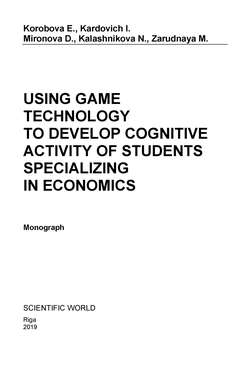Описание книги
New economic conditions in our country stipulate the necessity to optimize professional training of future specialists. Higher education has a challenging task of forming an active, creative, professionally competent economist, capable of solving complex tasks in the modern professional environment. The need for effective and rapid development of professional foreign-language competence has caused the necessity to find ways to optimize the process of teaching foreign languages in an economic university. With a limited number of contact hours allocated for teaching a foreign language in economic universities, successful learning is impossible without a high level of students’ cognitive activity. The monograph deals with certain criteria and characteristics of students’ cognitive activity, as well as the approaches and methods that contribute to its development. We consider that game technology is an effective way, method and form of developing cognitive activity in the process of teaching a foreign language to students specializing in economics. It helps to provide wide opportunities for developing students’ cognitive activity, increases the quality of acquired knowledge, and optimizes the entire learning process. The monograph deals with the content and organization of game activities at the lessons in integration with extracurricular activities. The theoretical positions of the research were verified experimentally. The final part of the monograph contains the conclusions and gives practical recommendations how to develop cognitive activity by means of game technology in the process of teaching a foreign language for professional purposes in a university.
